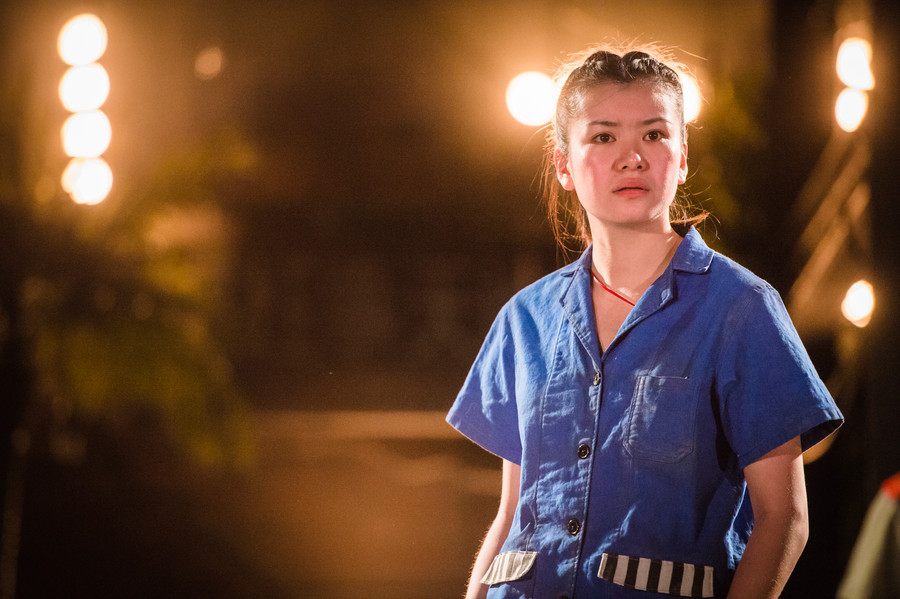
Do you fume about current politics? Do you despair of man’s inhumanity to man? Well Chinese culture and literature boast a potential remedy for injustice. The sole drawback being that redress has to be claimed from the other side of the grave.
Frances Ya-Chu Cowhig’s new play Snow in Midsummer is a fascinating – if only partially successful, reworking of Guan Hanqing’s 13th century classic: The Injustice to Dou E That Moved Heaven and Earth.
The time is now, the place is a remote Chinese factory town. A metallic café stage setting with two landings, flashes and throbs with digital lighting and percussive music. But the action played out assumes the co-existence of an eternal spirit world, alongside the Chinese capitalist take on communism.
Three years ago Dou Yi, a young widow, was unjustly convicted of murdering factory owner Master Zhang, and sent to her death swearing that unnatural events would follow, including the immediate snowfall of the title and a three year drought.
Now with the parched town nigh uninhabitable Tianyun – a businesswoman, arrives with her little daughter Fei-Fei, intent on buying the factories from Zhang’s homosexual son Handsome, who plans to travel with his partner, Rocket Wu.
Fei-Fei has been brought up by a Buddhist nurse and has absorbed the old beliefs. Dou Yi exercises mystical powers upon her to gain her mother’s help, as she seeks peace via a cleared name and a proper burial.
Secrets are exposed and more violence is committed, as truth emerges through flashbacks, albeit with motivation and morality short on credibility. The dialogue at times is unnatural and directionless, and promised injections of highly theatrical and blood-curdling Japanese ghost drama fail to emerge. A little more frightening mysticism would go a long way. .
Momentum though does begin to build post-interval. And in this beginning to a welcome programme of classic Chinese drama, it’s satisfying to see a contingent of British East Asian actors adapting well to major roles. Katie Leung as Dou Yi initially surprises with the irony lent by her Scottish accent, and given greater directorial focus and impact, could become the dramatic hub of the play.
In a double role as Doctor Lu and Master Zhang, Daniel York moves effortlessly from philosophical acceptor of tyranny to its brutal creator. Whilst Jacqueline Chan as Dou Yi’s stepmother, bristles with a spiky resentment born of a lifetime of oppression.
Ancient and modern elbow for room, as intriguing detail of the old beliefs emerge. The contrasts as Cowig wryly points out are less stark than you’d imagine. Cynical use and abuse of power, the mistreatment of the weak and the poor – especially the female weak and poor, are a constant. Changing that would take unimaginable levels of powerful magic or political determination. ★★★☆☆ Derek Briggs 9th March 2017
Photo by Ikin Yum (c) RSC

